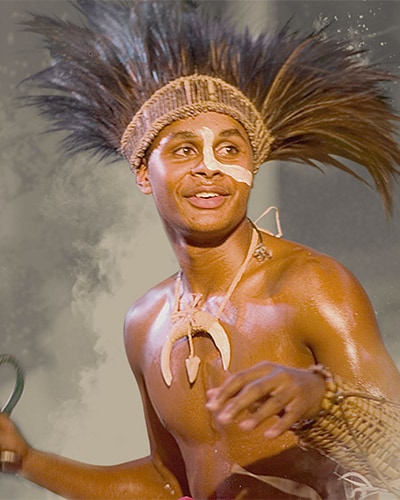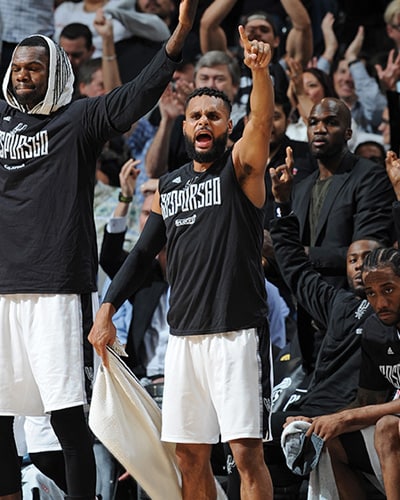Patty Mills: Bala, Brother
By: Lorne Chan, Spurs.com
Half of the students at Holy Trinity Primary School were enthralled by Yvonne Mills’ stories of Indigenous Australian history, but her time was up. She had another commitment before the assembly for older grades.
No problem, Yvonne said. There was an expert at the school who could give the same presentation, someone who could teach on 50,000 years of Aboriginal history.
Her 9-year-old son, Pat.
Almost 20 years later, Gregg Popovich gave a similar lesson on heritage to a crowd of Mills and his 14 teammates. It was June 3, 2014 – Eddie Mabo Day. The Spurs were about to begin the NBA Finals, and Popovich shared the story of the man who fought for land rights for Aboriginal Australians and was the first to win in 200 years.
Mabo is Patty Mills’ great-uncle.
The moment has become a part of Spurs lore. The team learning a piece of Mills’ heritage on the eve of the Finals.
Since then, Patty has shared his story many times, including at the San Antonio Museum of Art in March when an exhibit on Aboriginal art came through.
“Playing basketball is fun, and I love it and I enjoy it every day,” Mills said. “But I’ll never let basketball define me, because this is who I am. It’s not every day that an Indigenous kid gets this opportunity to share our history.”
The exhibit, Of Country And Culture, featured more than 100 pieces of art collected throughout history. On the Spurs’ first day back from the Rodeo Road Trip, Mills made a trip to the museum and said he was taken home.
San Antonio’s favorite Australian had a new avenue to share his story.
Visitors were invited to a special viewing in March, where there were two extra pieces on display. Paintings by Mills’ aunt, Joylene Haynes, that Patty took from the walls of his house.
“There is a deeper meaning to who we are, where we come from, and at the same time, why we play basketball.” - Patty Mills
Mills explained to attendees how his father, Benny, was from the Torres Strait Islands, where he was one of the first ones chosen to be a guinea pig and sent to the mainland to attend school.
And how his mother, Yvonne, was an Aboriginal Australian from the Koonibba Mission in South Australia, where she was one of the Stolen Generations. When she was 2, Yvonne and her siblings were forcibly removed from her family as part of an Australian government program. Yvonne, whose father was white and mother was Aboriginal, was deemed a “half-caste,” and the goal was to separate children like Yvonne in an effort for Aboriginal culture to die out.
Mills bared his soul, and he implored the audience to soak in the deep history of Aboriginal culture, the very thing the Australian government once went to great lengths to prevent.
“People talk about the Spurs and how we do a decent job at playing basketball,” Mills told the crowd. “But there is a deeper meaning to who we are, where we come from, and at the same time, why we play basketball.”

Courtesy: PattyMills.com.au
Leaning against a wall in the back of the room, Popovich smiled.
“This is my mission,” Mills said. “To be able to use as a platform to tell people where I’m really from and who I really am. Being Australian is a lot more than saying ‘g’day mate’ and ‘throw a shrimp on the Barbie.’”
Patty’s mission has long been in the making. Benny and Yvonne met while working for the Australian government on programs for Indigenous Australians. They started a basketball club called The Shadows for Indigenous Australians, which Patty joined at age 4.
While the Mills family lived in Canberra, the nation’s capital on the mainland, Benny and Yvonne played him island songs and enrolled him in an island dance troupe, ensuring that the rhythm of the Torres Strait Islands would be Patty’s heartbeat.
They told Patty about Mabo, a Torres Strait Islander who challenged the doctrine of Terra nullius, a doctrine that decided Australia had been unoccupied before white European settlers arrived in 1788. The legal battle took more than 10 years before the Australian High Court ruled in Mabo’s favor.
"It’s not every day that an Indigenous kid gets this opportunity to share our history.” - Patty Mills
In 1998, Australia held its first National Sorry Day on May 26 to commemorate the country’s mistreatment of Indigenous peoples.
Two years later, at the 2000 Sydney Summer Olympics, Patty was a 12-year-old in his parents’ living room when he watched Cathy Freeman, an Indigenous Australian, win a gold medal the nation behind her. When she took her victory lap, Freeman carried both the Aboriginal and Australian flags.
Fourteen years later, Mills carried two flags when the Spurs won the NBA Title. The Australian and Torres Strait Islands flags.
“Australia is still at a stage where it’s coming to embrace the Indigenous community at-large,” Benny Mills said. “It helps to see an NBA player promoting Australia and the Indigenous culture as one. Obviously, I’m proud of Patty, but so much of my pride is in the way he respects others and wants to bring awareness.”
Benny Mills’ son is arguably the most famous Indigenous Australian living in America. The platform is there for Patty, but the idea that a country or a culture is on a person’s shoulders can either be a weight or an opportunity.
Before Patty arrived stateside at Saint Mary’s College in 2007, he had always been raised in Indigenous culture. He had no idea how much or how little the rest of the world knew about Australia’s history, warts and all. He immediately realized how much sharing his heritage was going to become part of his life.

“I had a roommate who refused to believe that there were black people from Australia and that I just had this accent,” Mills said. “I got frustrated. I’m saying, ‘mate, you’ve never heard of Aboriginals?’ And he definitely never heard of the Torres Strait Islands. I wasn’t prepared for any of this, but as years have gone by, I’ve taken it as an opportunity to educate.”
One of the first Americans to get Patty Mills’ history lesson was his girlfriend, Alyssa Levesque. A forward on St. Mary’s women’s basketball team, they met in 2008 when she was a freshman and he was a sophomore. On one of their first dates, Mills told Levesque about his family and his heritage.
"Obviously I’m proud of Patty, but so much of my pride is in the way he respects others and wants to bring awareness.” - Benny Mills
“The way he talked, the way he is closer to his culture and closer to his family than anyone I’ve met,” Levesque said, “that’s who Patty is.”
Levesque has joined Mills on a few trips to Australia since then. Mills’ family has shown her their history, and Levesque has embraced their culture.
They took her fishing, taught her a traditional dance, and Levesque picked up a few words in Meriam Mir, the language spoken in the eastern part of the Torres Strait.
Damper, or bush bread, has been cooked in hot coals by Indigenous Australians for thousands of years with a process that brings one closer to the earth. Recipes have been passed down from generation to generation, and on a recent trip, Mills’ family passed it to Levesque. She watched Patty’s aunt work the dough and explain how ancestors had collected seeds and grain from the land.
So moved by her time with Mills’ family, Levesque is launching StraitSwim, a line of swimwear inspired by the Torres Strait Islands.
Set to launch this summer, one of the designs is called, “damper.”
“I know how hard Patty works to tell his story and explain to people that he’s more than just a basketball player from Australia,” Levesque said “He has this heritage that he’s so proud of and wants to share to the world. To do something that’s one of my passions and can help him share his, that means the world to me.”
Every morning of a Spurs game, Mills tweets “GAME DAY BALA GAME DAY!!!” to his 300,000 followers. The ritual caught on with Spurs fans who will call Mills ‘bala” in public.
Bala is the Meriam Mir word for brother.
“Whether it’s a conversation or you’re teaching people what Bala is, they’re all little reminders of who you are, where you come from and where you are right now,” Mills said.
When a fan says ‘bala’ or makes their way to the San Antonio Museum of Art, Mills said it’s raising cultural awareness bit by bit.

The irony isn’t lost on Yvonne Mills. She was taken from her family in an effort to erase Indigenous culture. Now, her son, with Aboriginal and Torres Strait Islander roots, is sharing their culture with the world.
“The message we gave Pat is that you have to rise above, that you make your own life for yourself and nobody else will do that for you.” - Yvonne Mills
Yvonne said she can’t go far in Australia without seeing a kid wearing a Mills jersey. And it’s all Australians – white and Indigenous – cheering for Patty Mills, the son of a Torres Strait Islander and one from the Ynunga people of South Australia.
“The message we gave Pat when he was growing up is that you have to rise above, that you make your own life for yourself and nobody else will do that for you,” Yvonne Mills said. “Indigenous Australians have a sad history, but you have to look at the positive side and the good that has come out of it. My sister started painting to help her to heal. She may not have been a painter if not as a result of her being taken away.”
Patty Mills said that as much as progress has been made, there is still a long way to go.
Last month, he posted his support for an Australian rules football club after two Indigenous players were subjected to racist remarks during a match.
“You want racism to stop, but it’s not like you can make it all go away,” Mills said. “The best way to counter that is to empower young Indigenous people and make them proud of who they are. Those are the key values I learned growing up and what I want to teach to other young Australians. Without that, nothing else matters.”
With that in mind, Mills is standing in the San Antonio Museum of Art, asking a few guests if they “want to go for a wander.”
The odds of 100 pieces of Aboriginal art winding up in a San Antonio museum, Mills says, might be as rare as an Indigenous Australian winding up in San Antonio to play basketball. Which is to say that it has only happened once, so make the most of it.
It’s a tall order, sharing 50,000 years of history and heritage.
Good thing Patty Mills has spent a lifetime telling the story.
“This is the fabric of our organization,” said Spurs General Manager R.C. Buford. “Basketball and the things we’ve shared as a team aren’t what we’ll all take away from each other. The experiences we’ve had together outside of basketball are what we’ll look back on and remember as unique.”
